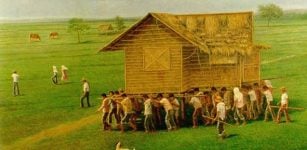Handsel Monday: Old Scottish Tradition Of Gift-Giving Celebrated First Monday In The New Year
MessageToEagle.com – Have you ever heard of a Handsel Monday festival? Most people haven’t. It’s an old Scottish tradition celebrated on the first Monday in the New Year.
After the Reformation of 1560, the old feast of Christmas was generally discouraged by the Church, but the period running up to New Year’s Eve, and its aftermath, was always celebrated as a holiday period in Scotland.
The first Monday of the year was called Handsel Monday because it was the custom on that day for Scots to exchange a handsel, or gift, as a good luck token.
Handsel Monday was important among the rural people of Scotland.

It was an occasion for gift giving at the start of the New Year, and it remained a Scottish tradition from the 14th until the 19th century. Later, it was replaced by Boxing Day that is celebrated a day after Christmas Day. Boxing Day originated in the United Kingdom, and is celebrated in a number of countries that previously formed part of the British Empire.
See also:
Hogmanay: Scotland’s New Year Celebration Inherited From The Vikings
Walpurgis Night Celebration In Northern Europe
More Ancient Traditions And Customs
An interesting description of Handsel Monday proceedings in Limerick can be found in “The Park Danes” by Patsy Harrold:
“Hansel Monday” was also celebrated on the first Monday of the New Year. On that morning a young boy in each house would be wished a happy New Year and given a half crown hansel by his mother. The woman would then usher her son out through the back door of the house. After closing this door, the mother would open the front one and welcome the boy back into the kitchen. The son’s wealth was short-lived, however, as the woman would quickly retrieve the hansel. Half-crowns were never too plentiful in Park.
Where the tradition first started is not entirely clear, but according to some sources handsel Monday is a tradition that was adopted from Ireland. The word handsel derives from Old Norse and Anglo-Saxon and means to ‘give into the hand’.
In Scotland there was a custom of putting a coin of small value as a good-luck charm in a handbag or purse given as a present. The superstition or tradition is widespread, but only in Scotland was it commonly called a handsel.
Handsel Monday was more generally observed than Hogmanay, Scotland’s New Year celebration inherited from the Vikings.
MessageToEagle.com
Expand for references










